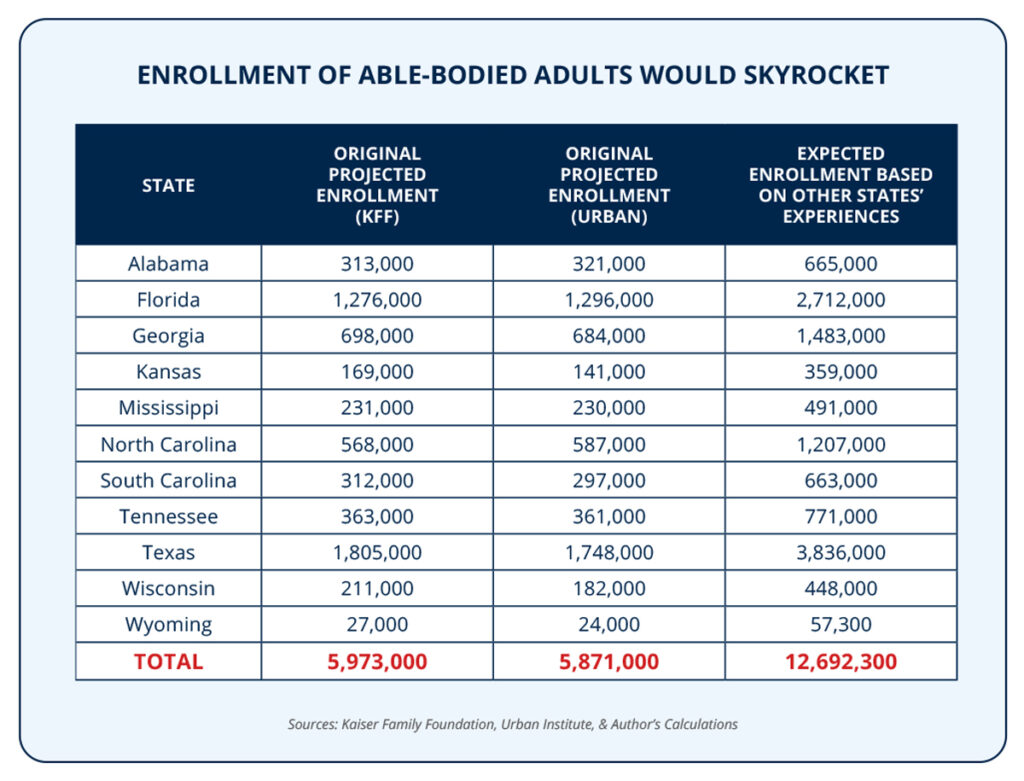Mississippi Medicaid Expansion Would Be a Big Mistake
- BY FGA
Mississippi is under tremendous pressure by activists on the Left to expand Medicaid under ObamaCare in the state.
The typical lies they’re spreading: “It’ll help low-income families.” “It’ll save our hospitals.” “It won’t be that many enrollees.” “We can afford it.”
With so many failures across the country as one by one states caved to the pressure and expanded Medicaid, believing—let alone spreading—any of these falsehoods is willful ignorance at best, a ploy to push the country toward single-payer health care at worst.
Here are several reasons why Mississippi should stand strong and NOT expand Medicaid:
Expansion will open the enrollment floodgates—estimates always go over
In every state that has expanded, enrollment predictions were modest and largely within the estimated budget of the state. But every single state went over those predictions quickly and alarmingly.
Medicaid expansion opens up a program that is intended to be a safety net for the truly needy to a new class of able-bodied adults. When expansion first started, it was estimated by “experts” that only 6.5 million able-bodied adults would ever enroll. The Kaiser Family Foundation (KFF) estimated roughly 8.6 million. Actual enrollment? 19 million people. That’s 186 percent higher than state estimates and 113 percent higher than KFF’s projections.
In early 2023, the total number of Americans on Medicaid surpassed 100 million—nearly one-third of the entire country. Here’s what Mississippi could be facing if the state expands Medicaid:

It will push Mississippians out of private insurance options
Most able-bodied adults who would have access to Medicaid under expansion already have private health care options through work on the exchange. Uninsured, low-income Mississippians are currently eligible for free and private silver health care plans on the exchange, and individuals with incomes up to four times the federal poverty level are eligible for big subsidies toward premiums.
However, with Medicaid expansion under ObamaCare, people become ineligible for the private plan subsidies and are shifted over to the state Medicaid program.
Yes, that’s right—Medicaid expansion takes money that should be used on the truly needy and other important state priorities and uses it to fund a welfare expansion for people who already have insurance.
If you like your plan, you can keep your plan—but only if Mississippi avoids expansion.
Medicaid expansion is terrible for workforce participation because it encourages able-bodied adults to not work and traps them in dependency
Our country is facing a labor crisis, and state and federal welfare policies are largely to blame. Despite expansion advocates in Mississippi saying it is about helping “the working poor,” the reality is that a majority of able-bodied adults on Medicaid nationally do not work at all. The massive enrollment in Medicaid in the last few decades coincides with a massive drop in labor force participation, which is even worse in Medicaid expansion states. With the federal government preventing states from implementing work requirements for Medicaid, does Mississippi want to be on the hook for adding able-bodied adults to welfare with no expectation that they work?
Medicaid expansion isn’t about helping people in need—it shoves them to the back of the line
Although the federal government does “chip in” financially to expansion, a huge portion of the cost comes from the state itself. Because able-bodied adults get a higher federal match, expansion puts able-bodied adults (again, who pretty much all had subsidized or free private insurance already) at the front of the line. Medicaid was designed to serve the truly needy, including people with disabilities, low-income children, and the elderly—not leave them languishing on waiting lists and stuck at the back of the line.
Medicaid expansion sinks the state budget with cost overruns and ballooning enrollment
If you thought enrollment predictions vs. reality were terrible, wait until you see the budget.
Even before the pandemic poured gasoline on the fire, spending in Medicaid was out of control. A 2019 paper from FGA found that 32 states had one-quarter or more of their budgets devoted solely to Medicaid spending. Some states, namely Missouri, Louisiana, and Pennsylvania, were nearing 40 percent. Medicaid spending—even in non-expansion states—has far outpaced growth in state revenues.
Mississippi already spends roughly one-quarter of its state budget on Medicaid. Is expansion worth crowding out other priorities, like public safety and education, to expand welfare for people who already have coverage?
It will risk further hospital closures
Pushing people off their private health plans and onto Medicaid isn’t just a problem with choice—it’s a huge drain for hospitals. Medicaid payment rates to providers are much lower than the private plans. Medicaid pays less than the cost, but private insurance pays more.
It should come as no surprise that roughly 50 hospitals have closed since expansion began in 2014, despite one of the supposed selling points of expansion being to “save” the hospitals. That’s a loss of more than 5,400 beds, including 500 at rural hospitals!
Mississippi has worked hard to have strong program integrity—don’t open the program to waste, fraud, and abuse
Mississippi put in some serious work toward welfare program integrity with the HOPE Act in 2017. It restored much of the 1990s-era welfare reform that helped ensure resources were protected for the truly needy and others were moved back into the workforce.
One of the most impactful reforms was adding in work requirements. Less than three years after implementing welfare reform, enrollment among able-bodied, childless adults fell by 72 percent. Mississippians found jobs in more than 700 unique industries. Incomes more than doubled within two years of moving from welfare to work. And taxpayers saved $93 million annually.
Mississippi boasted some of the lowest improper payment rates in Medicaid in 2022.
Although the Biden administration is hostile to efforts to reform welfare programs, Mississippi has a lot to be proud of and should do all it can to protect the work it has done. A surefire way to tank those efforts is to open the floodgates to able-bodied Medicaid enrollees.
